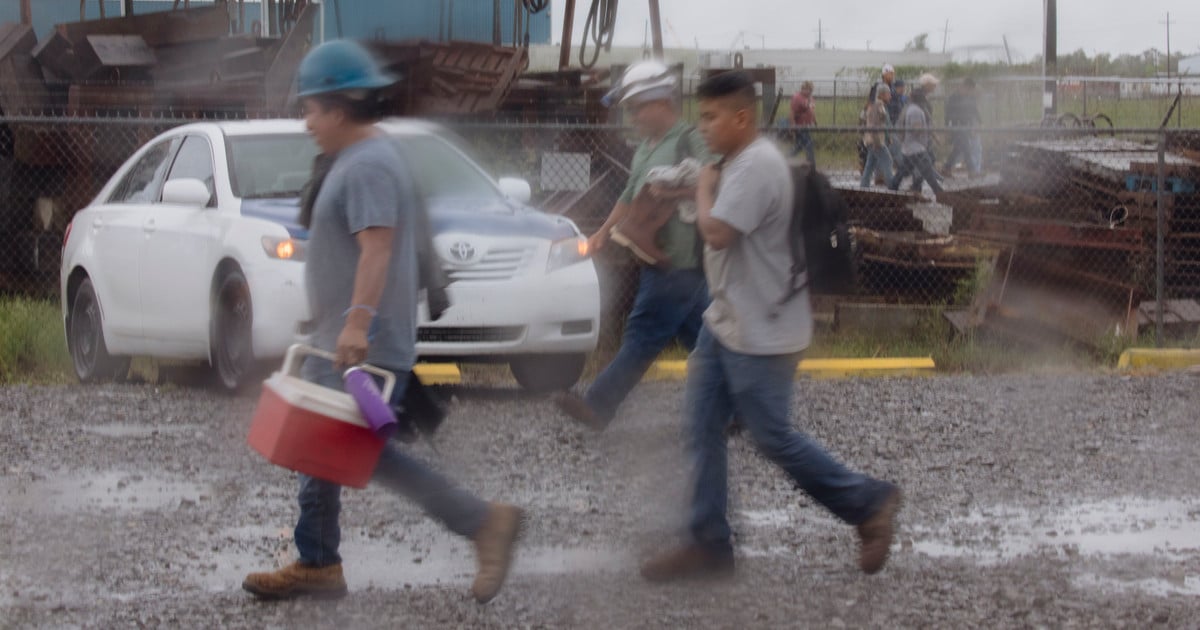- cross-posted to:
- [email protected]
- [email protected]
- cross-posted to:
- [email protected]
- [email protected]
On the morning of Jan. 22, 2024, Elmer De León Pérez descended deep into the bowels of a ship that he was helping to build in Houma, Louisiana. Pérez was a welder, working to construct one of the U.S. government’s most sophisticated ships, an $89 million vessel for tracking hurricanes and conducting oceanographic research. It was funded by President Joe Biden’s signature climate legislation.
When emergency workers found his body, Pérez was already showing signs of rigor mortis. A coroner’s report would note that he was wearing a red hoodie, plaid pajama pants and brown steel-toed boots, and that a “copious amount of clear fluid was noted to the mouth and nose,” as well as on the sleeve of his shirt. The coroner concluded that Pérez “died as a result of bilateral severe pulmonary consolidation and edema” — fluid in the lungs — and “copper and nickel intoxication.” (The ship, like many, used copper-nickel alloys as a coating because they resist corrosion from salt water.)
But Pérez wasn’t working directly for Thoma-Sea; he was employed by a contractor. So when he died, Thoma-Sea paid nothing. Not to his family, including the partner that survived him. Not to his toddler son. Not even to help send Pérez’s body home to Guatemala. Instead, his family borrowed money and desperately tried to raise the rest online. Family members said they haven’t heard anything from Thoma-Sea since Pérez died.
When Pérez’s partner sought death benefits from G-4 Services, the local staffing contractor that had hired him to work for Thoma-Sea, G-4 rebuffed her. “Pérez was a self-employed independent contractor and thus a claim for death benefits is not compensable,” a lawyer for the company wrote in May. G-4 contends that Pérez “wasn’t working at the time of his death” even though his corpse was found in the ship with his welding equipment.
[…]
Employers with federal contracts are supposed to ascertain workers’ eligibility — and ensure subcontractors do the same — using the government’s online E-Verify system, which checks identity information like Social Security numbers against federal databases. But experts say E-Verify makes it easy for workers to provide false information, and government agencies rarely monitor compliance with these rules.
[…]
G-4 is disputing the benefits claim, citing Peréz’s ineligibility as an independent contractor, saying his partner was ineligible because they were not legally married, and claiming the sudden death of a healthy 20-year-old was not caused by his job. His death, a medical review conducted at the request of G-4 argued, “occurred while he was working but was not caused by workplace related factors or activities.”So the problem here is a shady subcontractor company which hires undocumented immigrants as “independent contractors”, and probably doesn’t keep track of whether those workers are working on federal contracts or not, and they’re not being audited. These workers are probably uninsurable without valid documentation, so the company will do whatever it can to avoid having to pay out any benefits because they can’t actually carry legitimate insurance.
The solutions are:
- Increase the oversight on such companies and enforce rules about identity verification.
- Close the “independent contractor” loophole, forcing all workers to be fully documented and insured through their companies.
*Edit - further thought on this particular situation:The contractor (Thomas-Sea) violated the contract term which requires the contractor to verify that workers working on the federal contract are eligible (legally documented). Therefore, the contractor has produced a sub-standard product (the ship) which does not meet the terms of the contract. One must wonder which other requirements they have ignored or intentionally violated.
The federal government should refuse to accept completion of the contract/pay for the ship until the issue is resolved. The resolution should be that all workers who have worked on the contract must be legally documented - therefore the contractor should be required to arrange retroactive work visas for any workers attached to the contract who might need them, with no penalization of the workers themselves for not having visas. The contractor should pay to have this process expedited. The family of the dead man should be compensated for the contractor’s failure to ensure safe working conditions (again as a term for accepting completion of the contract). The contractor is responsible for the behavior of their subcontractor, so if Thomas-Sea wants to sue G-4 Services for the cost of the above, then that’s perfectly fine.
Also make it easier for undocumented immigrants to receive temporary work visas. That essentially fixes the independent contractor loophole especially when it comes to government contracts
Oh yes, this is a good point, make the work visas more available, then everything can be properly documented.
Another idea would be requiring independent contractors to carry their own insurance and provide documentation for it in order to be employed by a company. That way they have life and health benefit coverage, and we don’t necessarily have to get rid of the independent contractor category for this type of work.
Then we just have to push the companies to pay higher wages in order to cover the workers’ extra cost… which could be done by increasing minimum wage for all work.


